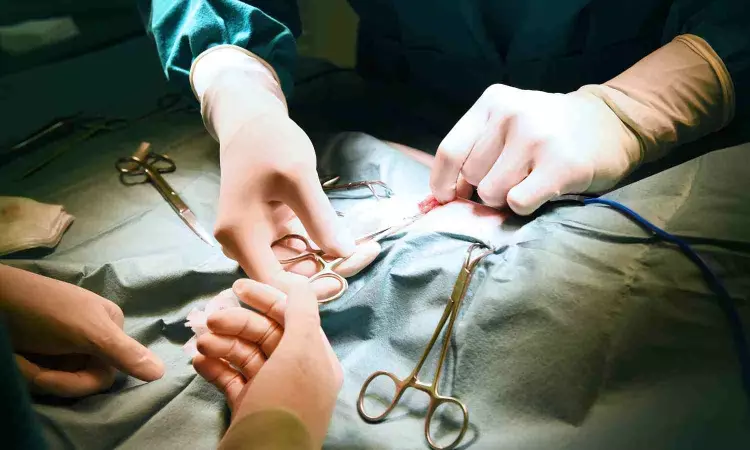- Home
- Medical news & Guidelines
- Anesthesiology
- Cardiology and CTVS
- Critical Care
- Dentistry
- Dermatology
- Diabetes and Endocrinology
- ENT
- Gastroenterology
- Medicine
- Nephrology
- Neurology
- Obstretics-Gynaecology
- Oncology
- Ophthalmology
- Orthopaedics
- Pediatrics-Neonatology
- Psychiatry
- Pulmonology
- Radiology
- Surgery
- Urology
- Laboratory Medicine
- Diet
- Nursing
- Paramedical
- Physiotherapy
- Health news
- Fact Check
- Bone Health Fact Check
- Brain Health Fact Check
- Cancer Related Fact Check
- Child Care Fact Check
- Dental and oral health fact check
- Diabetes and metabolic health fact check
- Diet and Nutrition Fact Check
- Eye and ENT Care Fact Check
- Fitness fact check
- Gut health fact check
- Heart health fact check
- Kidney health fact check
- Medical education fact check
- Men's health fact check
- Respiratory fact check
- Skin and hair care fact check
- Vaccine and Immunization fact check
- Women's health fact check
- AYUSH
- State News
- Andaman and Nicobar Islands
- Andhra Pradesh
- Arunachal Pradesh
- Assam
- Bihar
- Chandigarh
- Chattisgarh
- Dadra and Nagar Haveli
- Daman and Diu
- Delhi
- Goa
- Gujarat
- Haryana
- Himachal Pradesh
- Jammu & Kashmir
- Jharkhand
- Karnataka
- Kerala
- Ladakh
- Lakshadweep
- Madhya Pradesh
- Maharashtra
- Manipur
- Meghalaya
- Mizoram
- Nagaland
- Odisha
- Puducherry
- Punjab
- Rajasthan
- Sikkim
- Tamil Nadu
- Telangana
- Tripura
- Uttar Pradesh
- Uttrakhand
- West Bengal
- Medical Education
- Industry
Dangerous surgical site infections can be reduced with simple prevention protocol: Study

A new study published today in the American Journal of Infection Control (AJIC) demonstrates the use of a simple pre-surgical infection prevention protocol to prevent dangerous post-surgical infections. Researchers performed this investigation at the Soroka University Medical Center in Israel.
Surgical site infections (SSIs) are a type of healthcare-associated infection with deadly consequences for some patients. According to the latest data from the Centers for Disease Control and Prevention, there were more than 110,000 SSIs linked to inpatient surgeries in the U.S. in 2015.1 These infections lead to a high rate of morbidity and mortality, with a patient’s estimated risk of death as much as 11 times higher than normal.2 SSIs also have a very high financial burden, with the average hospital stay extended by nearly 10 days and an estimated $20,000 in additional hospitalization costs per patient.
There are a number of recommended protocols to help prevent SSIs, but lack of patient compliance, high costs, and bacterial resistance can reduce their utility and effectiveness. In this new study, researchers aimed to evaluate the results of a protocol designed to reduce SSIs through a particular focus on the Staphylococcus aureus pathogen. The approach involved a pre-surgical intranasal application of povidone-iodine and skin antisepsis using chlorhexidine gluconate (CHG).
The study involved 688 adult patients who had hip or knee arthroplasty or spine surgery at Soroka University Medical Center between February 2018 and October 2021. Their outcomes were compared to a retrospective patient cohort from 2016 and 2017 treated before the povidone-iodine component of the protocol was implemented. Patient outcomes were tracked for 90 days after surgery.
Deploying this intervention prior to surgery helped to address a broad challenge in healthcare, that some 30% of the population is colonized with S. aureus without exhibiting symptoms. The pre-surgical protocol successfully eradicated S. aureus in nearly 40% of patients found to already harbor the pathogen. This is particularly important for patient outcomes, as the researchers found that the presence of S. aureus within the day following surgery was associated with a three-fold risk of developing an SSI. Overall, the study showed a significant decrease in severe SSIs among patients who received the newer protocol.
“Our study clearly shows that we can prevent surgical site infections and keep patients safer through the use of a simple pre-surgical nasal application of povidone-iodine in combination with standard CHG bathing,” said Lisa Saidel-Odes, MD, Infectious Diseases specialist at Soroka University Medical Center and lead author of the paper. “We noted that the protocol is most effective in cases with little S. aureus present and suggest that an additional application of the povidone-iodine might be needed for patients with greater nasal colonization.”
Additional details from the study include:
- Of the 688 patients included, 28 developed an SSI in the 90-day study window. Patients with diabetes were at particularly increased risk for developing an SSI.
- Patients were screened for S. aureus prior to surgery. More than 16% were already colonized with either methicillin-sensitive or methicillin-resistant S. aureus.
- Of patients who developed SSIs, S. aureus was not the only cause of infection. Eleven patients were infected with Enterobacterales.
“This study shows the power of applying widely available antiseptics to reduce SSIs and improve patient safety,” said Tania Bubb, PhD, RN, CIC, FAPIC, 2024 APIC president. “The results are encouraging not only because the regimen is effective in reducing SSI, but also because it is simple to implement and avoids the risk of antibiotic resistance.”
Reference:
Lisa Saidel-Odes, Rivka Yosipovich, Vadim Benkovich, Orli Sagi, Orly Shimoni, Abraham Borer, Getting the drop on Staphylococcus aureus: Semiquantitative Staphylococcus aureus nasal colony reduction in orthopedic surgery reduces surgical site infection, American Journal of Infection Control, DOI:https://doi.org/10.1016/j.ajic.2024.02.014.
Dr Kamal Kant Kohli-MBBS, DTCD- a chest specialist with more than 30 years of practice and a flair for writing clinical articles, Dr Kamal Kant Kohli joined Medical Dialogues as a Chief Editor of Medical News. Besides writing articles, as an editor, he proofreads and verifies all the medical content published on Medical Dialogues including those coming from journals, studies,medical conferences,guidelines etc. Email: drkohli@medicaldialogues.in. Contact no. 011-43720751


